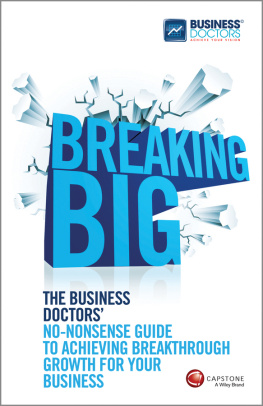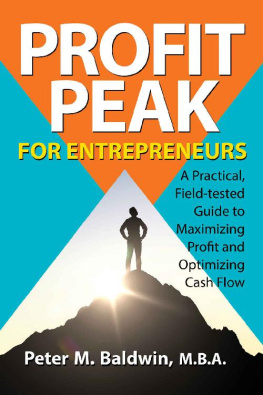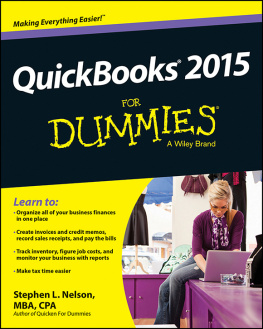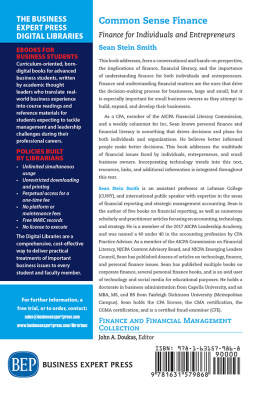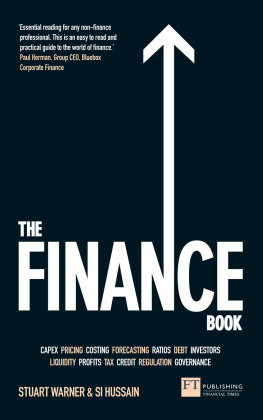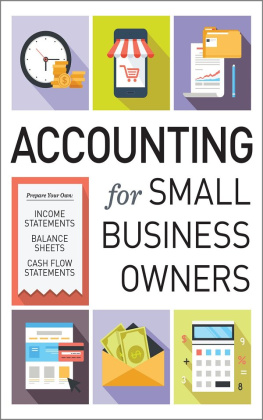The Entrepreneurs Guide to Financial Statements
David Worrell

Copyright 2014 by ABC-CLIO, LLC
All rights reserved. No part of this publication may be reproduced, stored in a retrieval system, or transmitted, in any form or by any means, electronic, mechanical, photocopying, recording, or otherwise, except for the inclusion of brief quotations in a review, without prior permission in writing from the publisher.
Library of Congress Cataloging-in-Publication Data
Worrell, David.
The entrepreneurs guide to financial statements / David Worrell.
pages cm.(The entrepreneurs guide)
Includes bibliographical references and index.
ISBN 9781440829352 (hardback)ISBN 9781440829369 (ebook)
1. Small businessFinance. 2. Financial statements. I. Title.
HG4027.7.W675 2014
658.15 12dc23 2013033748
ISBN: 9781440829352
EISBN: 9781440829369
1817161514 12345
This book is also available on the World Wide Web as an eBook.
Visit www.abc-clio.com for details.
Praeger
An Imprint of ABC-CLIO, LLC
ABC-CLIO, LLC
130 Cremona Drive, P.O. Box 1911
Santa Barbara, California 93116-1911
This book is printed on acid-free paper 
Manufactured in the United States of America
Recent Titles in The Entrepreneurs Guide
The Entrepreneurs Guide to Writing Business Plans and Proposals
K. Dennis Chambers
The Entrepreneurs Guide to Hiring and Building the Team
Ken Tanner
The Entrepreneurs Guide to Managing Information Technology
CJ Rhoads
The Entrepreneurs Guide to Successful Leadership
Dan Goldberg and Don Martin
The Entrepreneurs Guide to Marketing
Robert F. Everett
The Entrepreneurs Guide to Raising Capital
David Nour
The Entrepreneurs Guide to Selling
Jonathan London
The Entrepreneurs Guide to Advertising
James R. Ogden and Scott Rarick
The Entrepreneurs Guide to Mastering the Inner World of Business
Nanci Raphael
Contents
Tables and Figures
Tables
Figures
Preface
Life is full of opportunities to create, accomplish, and build. We humans have a limitless ability to imagine things that do not yet exist and to pursue them with passion and conviction. At heart, each of us is looking to leave our mark on the world. For some of us, that passion inevitably leads to a new chapter in our careers and suddenly we find ourselves building a company around activities that started as a simple hobby. The baker starts a bakery. The pilot launches an airline. The engineer builds a machine shop. It happens every day, in every city.
It seems natural enough, but when a passion turns into a business, something funny occurs: Suddenly, the business takes on a life of its own. Before long, the company is making demands that have nothing to do with our vision or our original passion. Bakeries have payroll; airlines need capital; a machine shop deals with inventory; and they all worry about cash flow.
Unfortunately, as business owners, we dont always possess the skills (or the time to develop the skills) to feed both our passion and the demands of our business. Hopefully, a practical hands-on business book like this one can fill in the gap and provide entrepreneurs with deeper insight into the most critical aspects of their businessin this case, understanding financial statements and using them to guide the growth of a business.
A strong and growing business can mean greater opportunity to do the kind of work that we lovebut we need to understand the financial foundation that makes it all possible. Financial statements are the key to this understanding and to making the kind of business decisions that will assure a long and prosperous career as an entrepreneur.
There are several reasons why we, as business owners, must take full responsibility for the financial statementsand financial healthof our business. Lets get going and start with a look at four of these reasons: Speaking the Language, Finding Our Direction, Managing through Change, and Spotting Opportunities and Trends.
Finance Is the Language of Business
Businesses speak in numbers. Even an art gallery or a cupcake shop tells its story in numbers: how many cupcakes are made, how many paintings are sold, how much profit is returned to the owner, and so on. The life story of a business is best understood when it is quantified.
Sure, marketers and human resource experts will tell you that a company is all about the people or nothing without the brand. And of course, that is true in a way. But even people and brands have to be counted, measured, and controlled. A company cannot hire an unlimited number of people; a marketing campaign cannot run on an unlimited budget. Even human resources and marketing must make decisions that produce real economic results, or the very fabric of a company quickly unravels. Fortunately, finance is a discipline that can help us make better decisions across the entire companyfrom purchasing and sales to marketing and HR.
Financeand particularly the use of financial statementsis the practice of understanding exactly how a business works, from the inside out.
Did the marketing campaign result in more profit than expense? (Should we do it again?)
Does our union contract leave enough money to buy new machines when the current equipment breaks?
Can we open a second location with more staff?
How many customers do we need to make the new location profitable?
These are just a few of the real business questions that finance can answer. Asking and answering these kinds of questions is vital to the success and sustainability of a business.
It is not enough to have a powerful vision, great products, or even smart people. Only a deeper dive into finance can show whether the effort is, and will be, successful at creating profits that will keep the business operating for years to come.
Where Is the Company Going?
Sometimes entrepreneurs are so busy building their business that they dont stop to see where they are heading. Like sailing alone across the ocean without a compass or a map, building a company without knowing the financial direction is unnecessarily risky. There are, of course, waypoints and weather to guide us: the rising and setting of the sun; gentle trade winds that can push us in the right direction; maybe even a few lighthouses along the way to keep us from the worst dangers. But a few days lost at sea will convince the hardiest soul of the value of a compass and map.
Just as a strong breeze can be either a helpful trade wind or the start of a disastrous storm, a change in cash flow can be caused by both good conditions and bad. It is a business owners job to know which is which. Without understanding finance, it is difficult for an owner to know whether she is sailing her company into a safe harbor or into the raging winds of a hurricane. A foundation in basic finance, however, will make the health and welfare of the company crystal clear.
Manage by the Numbers
Becoming familiar with finance is the key to unlocking the secrets of our business success. Fortunately, learning to use finance to guide our business is not as complex as it may seem, once someone explains the basics. The best part about using finance to understand our business is that the results are dynamic: the picture can changeand our actions can change it!



